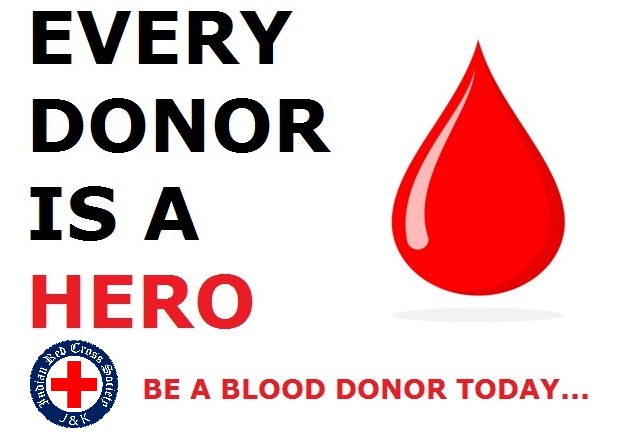- IRCS website
- Jammu and Kashmir
- Blood Donation
Blood Donation
Blood Donation
Blood donation is a selfless act of giving blood to help those in need, with one donation potentially saving up to three lives. It provides a free health screening for donors, improves circulation, and helps replenish blood supplies for emergencies, surgeries, and chronic illnesses like thalassemia. The process is safe and takes a short amount of time, with the donated blood being separated into components like red blood cells, plasma, and platelets.

Benefits for the recipient:
a) Saves lives: Donated blood is essential for people who have lost blood due to accidents or illness, and for those undergoing surgery.
b) Treats chronic illnesses: It provides a vital lifeline for patients with conditions like thalassemia and hemophilia.
c) Increases blood supply: Blood donation ensures that blood banks are well-stocked to meet emergency needs.
Benefits for the donor:
a) Free health screening: Donors receive a mini-health check, which includes monitoring of blood pressure, hemoglobin, and pulse rate.
b) Healthier heart: Donating blood can help reduce iron levels in the body, which may lower the risk of heart disease and stroke.
c) Improved circulation: Donating can help make blood less thick, which can enhance circulation.
d) Mental and emotional well-being: Donating blood provides a sense of fulfillment and can be a rewarding, humanitarian act

Indian Red Cross Society, J&K Chapter was formed In the year 1947. It acts as an auxiliary to the state authorities in providing humanitarian assistance.
Links
Contact
Red Cross Bhawan, Kachi Chawni, Jammu 180001
Red Cross House, Exchange Road, Srinagar 190001
Get Involved
What We Do
IRCS J&K ADDRESS
Red Cross Bhawan, Kachi Chawni,
Jammu 180001
Red Cross Building, Exchange Road, Lal Chowk, Srinagar 190001
-
Jammu office 0191-2520101
Srinagar Office 0194-3510091
-


